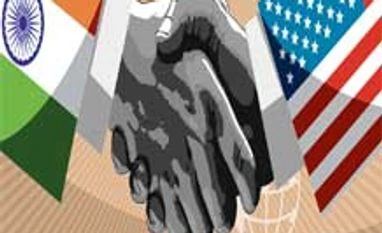The current policy of 49% FDI limit is not enough for transfer of high-tech defence technologies involving intellectual property rights, a top Pentagon official has said as India and the US are expected to hold talks on jet engine technology.
When asked if the 49% foreign direct investment (FDI) limit in the defence sector would be a hindrance in the transfer of jet engine technology, Keith Webster, Director and International Cooperation Office of the Under Secretary of defence for Acquisition, Technology and Logistics told PTI, "Yes, it would".
However, India has given assurance to the US that it is willing to waive of the current 49% FDI limit on a case by case basis if there is a compelling case.
"And what we have been told is that in those instances they would consider exercising that policy option," he said.
The US industry is actually very forthcoming and upbeat on new opportunities in India in the field of jet engines.
"That does not mean unilaterally handing over intellectual property that they invested billions of dollars in developing 70 years. That is not going to happen," he said.
"There are opportunities available for partnership in aircraft production and ultimately design. There might be some joint design work," he added.
The first meeting of the India-US Joint Working Group on jet engines and the signing of the terms of reference in this regard is likely to be held in India in about six weeks.
The creation of this joint working group on jet engines was announced early this year when US President Barack Obama visited India.
Its first meeting was scheduled this month in India, but was postponed at India's request.
Noting that the jet engine technologies are owned and developed by the industries, Webster said in order to move forward with any technology that is owned by an industry, the industry needs to see a credible business case moving forward.
All that the US can do is to try facilitate a dialogue, to understand in that discussion what are the things the government can do to contribute to India's needs.
"We are happy to provide our expert opinion on their approach to engine design and test," he said, adding that the US has a long history in government of proofing industry's designs and capabilities to ensure they meet military specifications.
"We can help advice. We can share approaches to tactics techniques and testing engines, proofing engines and validating capabilities of engines," Webster said.
When asked if the 49% foreign direct investment (FDI) limit in the defence sector would be a hindrance in the transfer of jet engine technology, Keith Webster, Director and International Cooperation Office of the Under Secretary of defence for Acquisition, Technology and Logistics told PTI, "Yes, it would".
However, India has given assurance to the US that it is willing to waive of the current 49% FDI limit on a case by case basis if there is a compelling case.
More From This Section
"They said they would definitely consider doing that. Our industries and government, we made clear that where there is industry anxiety over control of technology it (FDI) has to be greater than 49%," Webster said.
"And what we have been told is that in those instances they would consider exercising that policy option," he said.
The US industry is actually very forthcoming and upbeat on new opportunities in India in the field of jet engines.
"That does not mean unilaterally handing over intellectual property that they invested billions of dollars in developing 70 years. That is not going to happen," he said.
"There are opportunities available for partnership in aircraft production and ultimately design. There might be some joint design work," he added.
The first meeting of the India-US Joint Working Group on jet engines and the signing of the terms of reference in this regard is likely to be held in India in about six weeks.
The creation of this joint working group on jet engines was announced early this year when US President Barack Obama visited India.
Its first meeting was scheduled this month in India, but was postponed at India's request.
Noting that the jet engine technologies are owned and developed by the industries, Webster said in order to move forward with any technology that is owned by an industry, the industry needs to see a credible business case moving forward.
All that the US can do is to try facilitate a dialogue, to understand in that discussion what are the things the government can do to contribute to India's needs.
"We are happy to provide our expert opinion on their approach to engine design and test," he said, adding that the US has a long history in government of proofing industry's designs and capabilities to ensure they meet military specifications.
"We can help advice. We can share approaches to tactics techniques and testing engines, proofing engines and validating capabilities of engines," Webster said.
)